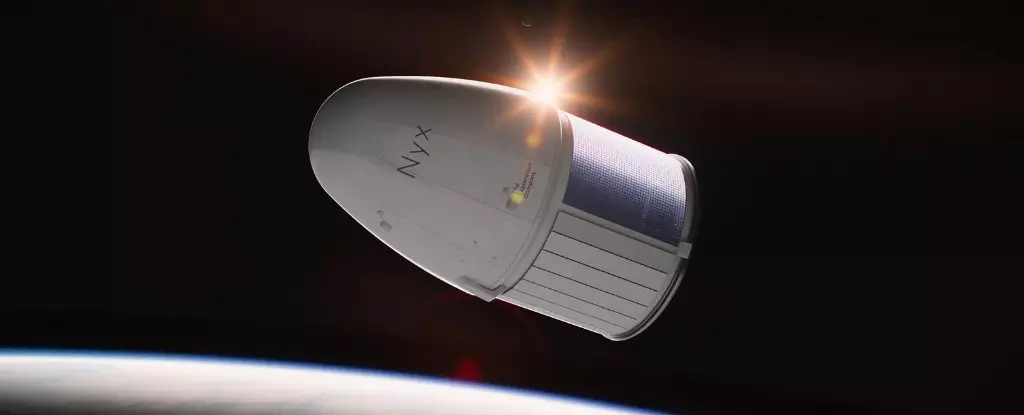Since the launch of Sputnik 1 in 1957, our ventures into space have primarily been driven by scientific curiosity, national pride, and technological progress. However, as the commercial space industry flourishes, the scope of what we send into the cosmos is expanding dramatically. No longer confined to telescopes, scientific probes, or communication satellites, space payloads now reflect humanity’s diverse desires—from memorials to botanical experiments—demonstrating a profound shift toward personal, commercial, and even sentimental endeavors. These new payloads embody our expanding ambitions and willingness to push boundaries, but they also reveal the inherent fragility and high stakes of such pioneering efforts.
The recent deployment of the Nyx capsule by The Exploration Company exemplifies this bold new era. Unlike traditional payloads, Nyx carried human remains, DNA samples, and plant matter into space—an act that elevates space from a purely scientific domain to a space of personal significance. This change signals a remarkable shift: space is becoming an extension of human experience, a place where individuals seek connection, legacy, and even ecological experimentation beyond Earth. Yet, it also exposes the accompanying risks associated with rapid innovation and commercial ambitions that often outpace technological maturity.
The Challenges and Risks of Commercial Space Innovation
The mission of the Nyx capsule, while audacious and inspiring, was marred by failure—a stark reminder of the immense difficulties in venturing into uncharted technological territories. The capsule successfully launched and reached orbit, and its core systems performed nominally, demonstrating impressive engineering progress. However, the failure of the parachutes during reentry, which caused Nyx to crash into the Pacific Ocean, illustrates the complexities of space retrieval operations. It’s a sobering lesson: even as we celebrate technological milestones, we must accept that setbacks are inherent in the pursuit of innovation.
Such failures reveal more than engineering deficiencies; they expose the vulnerabilities of pushing experimental payloads into space on tight schedules and innovative designs. The Exploration Company’s candid acknowledgment of the “partial success” underscores a maturity in the emerging commercial space sector—an understanding that setbacks are part of the growth process. This transparency, while admirable, raises questions about risk management and the pace at which new entrants are willing to accept failure as part of progress. If anything, these incidents reflect the volatile nature of space development, especially when launching cargo that carries significant sentimental and scientific value.
Furthermore, the loss of payloads like those of Celestis hints at a broader ethical dilemma—how do we manage emotional attachments and financial investments when space missions inevitably encounter failures? The families of those whose remains were lost deservedly felt a sense of grief, yet Celestis responded with empathy and a sense of hope, emphasizing that their loved ones achieved a monumental milestone regardless of the crash. These moments underline the human aspect of space endeavors, highlighting that behind every payload is a story, a legacy, and real human emotion.
Personalization in Space: The New Wave of Cosmic Connection
What makes these endeavors truly fascinating is the personalization of space missions. Sending human remains, DNA, or botanical specimens signifies an emotional and existential attachment to space exploration. It transforms space from a distant frontier into a realm that touches personal identities, memories, and future aspirations. The idea of launching loved ones’ remains into orbit or to other celestial destinations turns space into a final resting place—a cosmic cemetery—challenging traditional notions of legacy and closure.
This trend raises some unsettling yet captivating questions about boundaries and ethics. If individuals or families are willing to pay substantial sums for space burials or the transportation of biological samples, where do we draw the line? Are we setting ourselves up for exploitation, or are these acts an authentic extension of human longing for connection? The potential for commercialization and personalization in space must be balanced with responsibility and oversight, yet current efforts seem to lean toward a free-market approach—powered by innovation and consumer demand.
Simultaneously, the inclusion of biological experiments like the study of cannabis seeds under microgravity conditions illustrates a broader scientific motivation: understanding life beyond Earth. If scientists can cultivate resilient plants in space, it unlocks possibilities for future colonization and ecological sustainability on Mars or other planets. These experiments embody a pragmatic optimism—using microgravity as a testing ground for life’s resilience, which could be crucial for humanity’s long-term survival.
The Road Ahead: Navigating Innovation with Caution and Determination
Looking forward, the ambitions of companies like The Exploration Company reveal a vision of a diversified and accessible space economy. Their plans to demonstrate cargo transport capabilities to the International Space Station and beyond underscore the desire to make space more routine and personal. A demonstration flight scheduled for 2028, pending support from European agencies, signifies a concrete step toward this goal.
However, the path isn’t without perils. Technical failures, funding uncertainties, and regulatory hurdles persist, reminding us that space remains a high-risk environment. Each setback, such as Nyx’s crash or the failed Ariane 6 reentry capsule, serves as a valuable lesson—prompting innovations in safety, reliability, and operational protocols. These challenges may slow progress but ultimately strengthen the resilience of this emerging industry.
The relentless pursuit of innovation, despite mishaps, reveals a culture that values experimentation and learning, even at the cost of setbacks. The willingness to take risks signals a maturation of space endeavors; it shows that humanity is willing to confront failure head-on to carve out new pathways for exploration, commercialization, and personal expression beyond Earth. The future of space payloads, and by extension our dreams of making space more personal and accessible, hinges on how we learn from these failures and persist with purpose, resilience, and a sense of adventure.


Leave a Reply